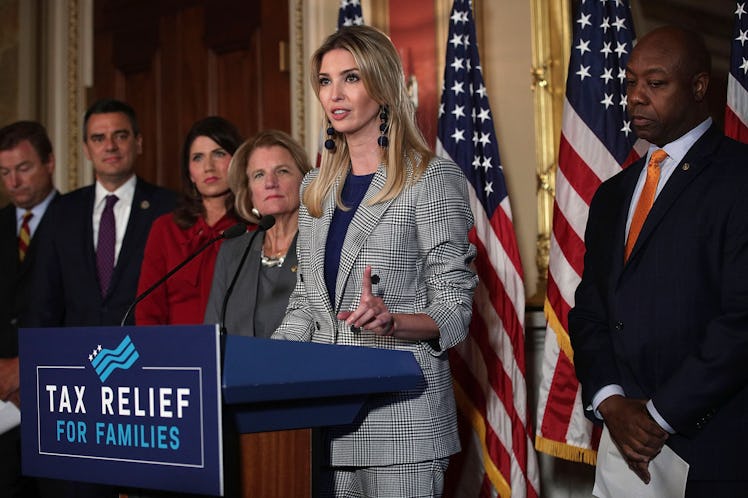
Ivanka Trump's Response To The GOP Tax Bill Calls It A "Major Win" & We're Not So Sure
Senate Republicans finally passed the GOP tax bill with a slight 51-48 win. A final vote from the House of Representatives on Wednesday, Dec. 20, confirms passage in Congress, so it headed to President Donald Trump's desk. The major tax overhaul is expected to take effect Jan. 1, 2018 as President Trump approves the bill on Wednesday, like he is expected to. Despite the controversy and concerns among many opposing Democrats, it's a victory for Republican lawmakers, including Ivanka Trump, whose response to the GOP tax bill was that it is a "great win" for Americans.
"Today marks a great win for all Americans. The Tax Cuts and Jobs Act provides $5.5 trillion in tax cuts, $3.2 trillion, or nearly 60 percent, of which go to families," Ivanka Trump tweeted on Wednesday following the House vote.
Ivanka Trump has been a major player in promoting the tax bill, especially with her specific provision of the child tax credit, which would double the current child tax credit, giving parents a $1,400 tax refund. Pro-family issues, such as paid family leave and help for working mothers has been a key aspect in Trump's visionary leadership, and Ivanka claims this bill would greatly benefit working families and children. However, many anticipate the bill will have the worst effects on middle-class mothers and children, and give the most benefits to the wealthiest earners.
Ivanka Trump talked about the tax bill on Dec. 18 on Fox & Friends, saying, "We're going to deliver historic tax reforms and it's going to happen before Christmas. It's going to be the fulfillment of an enormous campaign promise, and something that's just tremendously important for the American people."
Trump continued to tell Fox & Friends that, "the president wanted to deliver middle-income tax relief," and said that the bill would do exactly that.
Early Wednesday morning, Dec. 20, Ivanka Trump tweeted her excitement for the Republican victory saying, "The Senate has passed the #TaxCutsandJobsBill. These landmark tax cuts are a major win for the American people!"
The $1,400 child tax credit that Ivanka Trump has been crusading for is not guaranteed to help families in full, according to NBC News. Depending on income, families with higher-household income could be eligible for $2,000 per child, while lower-income families may only be able to receive $75 or less of the tax credit. But not everyone is entitled to the full $1,400, which scales up with income. This will greatly affect low-income single mothers, the group that Ivanka Trump claims to empower the most.
During a speech at the Republican National Convention in Cleveland in 2016, Ivanka Trump talked about her plan to support working mothers. She said, "As a mother myself, of three young children, I know how hard it is to work while raising a family. And I also know that I'm far more fortunate than most. American families need relief."
For the months leading up to December, Ivanka has pioneered for the child tax credit provision by accompanying her father at town halls and rallies, as well as meeting with conservatives and lawmakers, like Senators Marco Rubio and Mike Lee, on the Hill to gain support.
While campaigning for the bill, critics referred to Ivanka Trump's provision as a "pet project." In response, she told the Associated Press, "I get a little bit frustrated when people call it a pet project. This is a major project, this is not a pet project. This is a major initiative to ensure that there is meaningful middle-income tax relief for the American taxpayer."
It's unclear whether or not the tax bill will indeed provide the middle-income tax relief that she claims, because the effects of the new tax bill will likely not be felt until 2019. While the new system will technically go into on Jan. 1, 2018, Americans will be filing 2017 taxes in April 2018 under the current tax code.
The new tax system also stretches over 10 years, which means the biggest cuts will likely happen in 2019 and 2020, and could possibly rise again by 2027, according to CNBC.